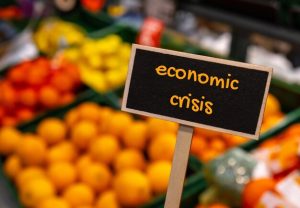Economic crises are inevitable phenomena that have occurred repeatedly throughout history, often leaving a trail of economic disruption and uncertainty in their wake. These crises can be triggered by a multitude of factors, including wars, natural disasters, economic recessions, or pandemics, each leaving a unique imprint on global markets.
In recent years, we have witnessed several significant economic crises that have shaken the foundations of the global financial system:
-
The COVID-19 Pandemic: The outbreak of the coronavirus in 2019 sent shockwaves through the global economy. Lockdowns, business closures, and supply chain disruptions led to a severe recession, job losses, and a dramatic shift in consumer behavior. While many industries suffered, the pandemic also accelerated the growth of e-commerce, technology, and healthcare sectors, creating new opportunities for investors and traders.
-
The War in Ukraine: Russia’s invasion of Ukraine in 2022 triggered a new wave of uncertainty and volatility in global markets. The conflict disrupted energy markets, leading to soaring oil and gas prices, and impacted the supply of essential commodities like wheat and fertilizers. This exacerbated inflationary pressures and created new geopolitical risks, forcing investors to reassess their strategies and risk tolerance.
-
Global Inflation: The surge in inflation across many countries has become a major concern for investors and policymakers alike. Rising prices erode purchasing power, impact consumer spending, and can lead to tighter monetary policies, affecting borrowing costs and investment decisions. Navigating inflationary environments requires careful analysis of market trends and an understanding of how different asset classes perform under such conditions.
Economic crises have devastating impacts on global markets:
- Severe Volatility: During crises, volatility in financial markets increases sharply. These fluctuations make trading more difficult and risky for traders.
- Reduced Liquidity: In times of crisis, investors tend to liquidate their assets and exit the market. This reduces market liquidity and makes trading more difficult.
- Increased Risk: During crises, the risk of trading in financial markets increases significantly. Various factors, such as severe volatility, uncertainty, and negative news, contribute to increased market risk.
- Changes in Trader Behavior and Psychology: Economic crises can negatively affect trader behavior and psychology. Fear, anxiety, and despair are among the emotions that grip traders during crises.Investor Psychology in Times of Crisis:
Economic crises can evoke strong emotional responses in investors, leading to irrational behavior and poor decision-making. Fear and anxiety can drive investors to panic selling, while greed can lead to excessive risk-taking.
To navigate these psychological challenges, it’s important to:
- Recognize your biases: Be aware of common cognitive biases, such as confirmation bias and anchoring bias, that can cloud your judgment.
- Develop a trading plan: Having a well-defined trading plan can help you stay disciplined and avoid impulsive decisions.
- Manage your emotions: Practice stress management techniques, such as mindfulness or meditation, to stay calm and focused during turbulent times.
- Seek support: Connect with other traders or mentors to share experiences and gain valuable insights.
In such circumstances, analyzing market trends after a crisis is of paramount importance:
- Identifying Opportunities: By accurately analyzing market trends, suitable trading opportunities can be identified and exploited.
- Reducing Risk: Market trend analysis helps traders better understand market conditions and make more informed trading decisions.
- Capital Management: Market trend analysis assists traders in properly managing their capital and preserving it during crises.
In the following sections, we will examine the challenges and opportunities present in global markets after economic crises and provide key tips for successful trading during these times.
By following these insights, you can enhance your knowledge and skills in analyzing market trends after crises and become a successful trader.

Part One: Challenges
Traders face numerous challenges in the aftermath of economic crises:
1. Severe Market Volatility:
One of the most prominent features of the market in the post-crisis period is its severe volatility. These fluctuations make predicting market trends more difficult and trading riskier.
Example: During the COVID-19 pandemic crisis, global market indices experienced a sharp decline in a short period. For instance, the S&P 500 index fell by more than 30% in March 2020.
2. Reduced Liquidity:
During times of crisis, investors tend to liquidate their assets and exit the market. This reduces market liquidity and makes trading more difficult.
Example: In the Ukrainian war crisis, many foreign investors exited Russian markets. This led to a sharp decline in the liquidity of the Moscow Stock Exchange.
3. Increased Trading Risk:
During crises, the risk of trading in financial markets increases significantly. Various factors, such as severe volatility, uncertainty, and negative news, contribute to increased market risk.
Example: In the global inflation crisis, many traders suffered heavy losses due to increased market risk.
4. Changes in Trader Behavior and Psychology:
Economic crises can negatively affect trader behavior and psychology. Fear, anxiety, and despair are among the emotions that grip traders during crises.
Example: During the COVID-19 pandemic crisis, many traders refrained from trading in the markets due to fear of loss.
These challenges can make trading more difficult and risky in the post-crisis period. Traders must be aware of these challenges and take appropriate measures to succeed during these times.
Part Two: Opportunities
Alongside challenges, there are also numerous opportunities in global markets after economic crises:
1. Identifying Valuable Stocks and Other Assets:
In the post-crisis period, the price of many stocks and other assets decreases significantly. This is a suitable opportunity for traders to buy valuable stocks and assets at low prices.
Example: During the COVID-19 pandemic crisis, the price of many large company stocks fell sharply. However, after the crisis passed, the price of these stocks increased significantly, bringing substantial profits to shareholders.
2. Utilizing Appropriate Trading Strategies:
Traders can use appropriate trading strategies to their advantage during the severe market fluctuations in the post-crisis period.
Example: Trading strategies such as counter-trend trading can be profitable during periods of severe market volatility.
3. Risk Control and Capital Management:
In the post-crisis period, risk control and capital management are of paramount importance. Traders should use various tools and techniques to minimize the risk of their trades.
Example: Using stop-loss orders is an important tool for controlling trading risk during crises.
4. Patience:
Traders should be patient during the post-crisis period and avoid rushing into trades. The market needs time to stabilize after a crisis.
Example: In the Ukrainian war crisis, many traders suffered losses due to rushing into trades.
By utilizing these opportunities and observing key points, traders can achieve success in the post-crisis period.
Part Three: Key Tips for Traders
Here are some key tips for successful trading after economic crises:
1. Patience:
Patience is crucial in the post-crisis period. The market needs time to stabilize after a crisis. Traders should avoid rushing into trades and wait for suitable opportunities to enter the market.
2. Trade with a Plan and Strategy:
Traders should have a clear plan and strategy before entering any trade. This plan should include trading goals, risk tolerance, entry and exit points, and other important parameters.
3. Use Technical and Fundamental Analysis Tools:
Technical and fundamental analysis are two important tools for predicting market trends and identifying trading opportunities. Traders should use these tools to accurately analyze the market and make informed trading decisions.
4. Control Emotions and Maintain Discipline:
Controlling emotions is more difficult in the post-crisis period. Traders must maintain discipline under all circumstances and avoid emotional decision-making.
5. Learn and Update Knowledge:
Learning and updating knowledge is crucial in the ever-changing world of financial markets. Traders should enhance their knowledge and skills by studying reliable resources and participating in training courses.
6. Diversify the Trading Portfolio:
Diversifying the trading portfolio is one way to reduce trading risk. Traders should spread their risk across their trading portfolio by investing in different stocks and assets.
7. Seek Advice from Experts:
Consulting with experts can help traders make more informed trading decisions. Traders can seek advice from analysts, experienced traders, and other financial market professionals.
By observing these key points, traders can increase their chances of success in trading after economic crises.
Conclusion:
In this article, we examined the challenges and opportunities present in global markets after economic crises.
In the first section, we introduced challenges such as severe market volatility, reduced liquidity, increased trading risk, and changes in trader behavior and psychology.
In the second section, we introduced opportunities such as identifying valuable stocks and other assets, utilizing appropriate trading strategies, controlling risk and managing capital, and exercising patience.
In the third section, we provided key tips for successful trading after a crisis.
Finally, we concluded that analyzing market trends after economic crises is of paramount importance. By utilizing this analysis, traders can identify opportunities in the market and use them to their advantage.
The overall outlook for global markets after economic crises depends on various factors, such as the type of crisis, government economic policies, and investor behavior. However, in general, it can be expected that the market will return to stability and relative prosperity after overcoming the crisis.
By exercising patience, careful planning, utilizing technical and fundamental analysis tools, and controlling their emotions, traders can achieve success in the post-crisis period.





The use of offensive and immoral words and content in any form and by any person is prohibited.
Publishing any non-economic views, promoting the site, promoting social network pages, including contact information and unrelated links is not allowed.
Comments that violate the above rules will not be approved.